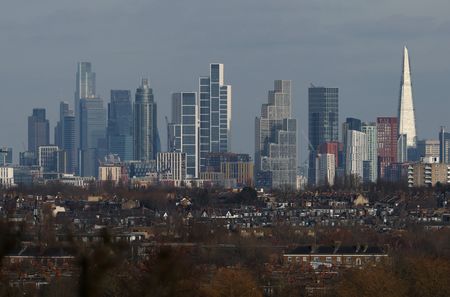By David Milliken and Suban Abdulla
LONDON (Reuters) -Britain’s economy returned to growth in February with its fastest expansion in 11 months, beating economists’ expectations and placing it on a slightly firmer footing as it braces for the impact of U.S. tariffs.
British gross domestic product grew at a monthly pace of 0.5% in February, the Office for National Statistics said on Friday, beating all forecasts in a Reuters poll of 30 economists, which had pointed to a 0.1% rise.
Previous January data which had shown a small contraction was revised up to show zero growth. Compared with a year earlier, GDP in February was 1.4% higher, also beating expectations.
Finance minister Rachel Reeves called the data “encouraging” and investors trimmed their bets on Bank of England interest rate cuts for the remainder of this year.
However, markets are far more focused on U.S. President Donald Trump’s tariffs which BoE Deputy Governor Sarah Breeden warned on Thursday would have a “chilling effect” on output.
“February’s figures have been pushed firmly into the background by the financial market bedlam caused by Trump’s tariff announcements,” said Suren Thiru, economics director at the ICAEW accountancy body.
US TARIFFS IMPACT
In March, government budget forecasters halved their 2025 forecast for Britain’s economic growth to 1%, which would follow a lacklustre 1.1% last year. The forecasters saw a stronger performance of 1.9% in 2026.
These forecasts have since been thrown into doubt by Trump’s announcement last week of sweeping tariffs on U.S. imports, which will raise the cost of most British exports to the United States by at least 10%.
Higher tariff rates for other countries have been suspended for 90 days to allow time for negotiations.
Separate trade figures showed British goods exports to the United States rose by 0.5 billion pounds ($0.65 billion) to their highest since November 2022, while imports increased by 0.2 billion pounds.
Businesses may have been trying to rush goods to the United States before tariffs took effect, some analysts said. The ONS said the figures might show a change in behaviour but also highlighted that the monthly figures were often volatile.
Britain’s global goods and services trade deficit, excluding precious metals, narrowed by 7.5 billion pounds to its lowest since the three months to July 2021 at 1.045 billion pounds in the three months to February 2025.
Economists at Pantheon Macroeconomics said February’s GDP jump might prove short-lived due to the impact on growth in the coming years of what it called an ongoing trade war.
“From the UK’s perspective, we can take only modest comfort that the UK remains relatively more insulated from the direct impact of greater trade barriers with the U.S., as it exports more services than goods, and trades more overall with other partners,” Elliott Jordan-Doak, senior UK economist at Pantheon, said.
Even before the tariff announcement, Britain and other European economies had slowed due to worries about U.S. trade policy. British businesses also said they were reining in hiring and investment plans due to a big rise in employment taxes and the minimum wage that took effect this month.
However, there had been some signs that weak consumer spending had been starting to pick up as wage growth continued to outstrip inflation and retail sales beat economists’ expectations in February.
Services output grew a moderate 0.3% in February after a 0.1% rise in January, Friday’s data showed, while manufacturing output leapt by 2.2% on the month, which the ONS said reflected a pickup in electronics, pharmaceuticals and car manufacturing.
Construction also picked up on a month-on-month basis, providing a potential boost for the Labour government, which wants to speed up house building. ($1 = 0.7661 pounds)
(Reporting by David Milliken and Suban Abdulla; Editing by Kate Holton, Edwina Gibbs and Hugh Lawson)











